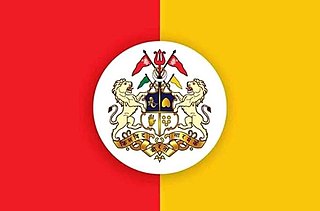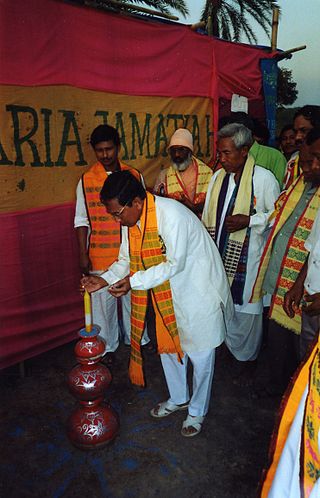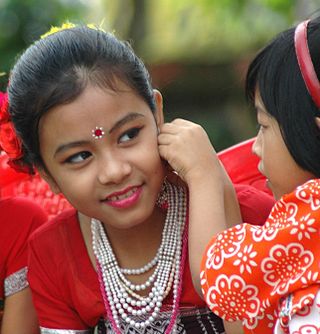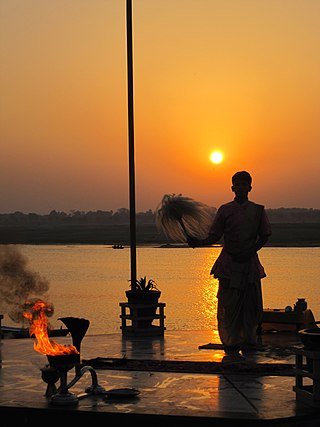Related Research Articles

Bihu is of three types and it is an important cultural festival unique to the Indian state of Assam – 'Rongali' or 'Bohag Bihu' observed in April, 'Kongali' or 'Kati Bihu' observed in October or November, and 'Bhogali' or 'Magh Bihu' observed in January. The festivals present an admixture of Tibeto-Barman, Austroasiatic and Indo-Aryan traditions entwined so intricately that it is impossible to separate them—festivals which are uniquely Assamese to which all communities of Assam had contributed elements. The Rongali Bihu is the most important of the three, celebrating spring festival. The Bhogali Bihu or the Magh Bihu is a harvest festival, with community feasts. The Kongali Bihu or the Kati Bihu is the sombre, thrifty one reflecting a season of short supplies and is an animistic festival.

Tripura is a state in northeastern India. The third-smallest state in the country, it covers 10,491 km2 (4,051 sq mi); and the seventh-least populous state with a population of 3.67 million. It is bordered by Assam and Mizoram to the east and by Bangladesh to the north, south and west. Tripura is divided into 8 districts and 23 sub-divisions, where Agartala is the capital and the largest city in the state. Tripura has 19 different tribal communities with a majority Bengali population. Bengali, English and Kokborok are the state's official languages.

Agartala is the capital and the largest city of the Indian state of Tripura, situated on the banks of Haora/Saidra River, about 2 kilometres (1.2 mi) east of the border with Bangladesh and about 2,499 km (1,552 mi) from the national capital, New Delhi. According to 2022 AMC data, Agartala is the second most populous city after Guwahati in Northeast India. It is India's third international internet gateway and being developed under the Smart Cities Mission.

Makar(a) Sankrānti, also referred to as Uttarāyana, Makara, or simply Sankrānti, is a Hindu observance and a festival. Usually falling on the date of 14 January annually, this occasion marks the transition of the sun from the zodiac of Sagittarius (dhanu) to Capricorn (makara). Since the sun has made this transition which vaguely coincides with moving from south to north, the festival is dedicated to the solar deity, Surya, and is observed to mark a new beginning. Many multi-day festivals are organised on this occasion all over India.

Kokborok (or Tripuri) is a Tibeto-Burman language of the Indian state of Tripura and neighbouring areas of Bangladesh. Its name comes from kók meaning "verbal" or "language" and borok meaning "people" or "human", It is one of the ancient languages of Northeast India.

Bijoy Kumar Hrangkhawl is the current president of The Indigenous Progressive Regional Alliance or TIPRA. He was the leader of the Indigenous Nationalist Party of Twipra, a political party based in the Indian state of Tripura.

The Tripuri people (Kókborok: Tripuri dópha rok, are a Tibeto-Burman-speaking ethnic group of Bangladesh and Northeast Indian state of Tripura. They are the descendants of the inhabitants of the Twipra/Tripura Kingdom in North-East India and Bangladesh. The Tripuri people through the Manikya dynasty ruled the Kingdom of Tripura for over 600 years starting from 1400 A.D. until the kingdom joined the Indian Union on 15 October 1949. The Tipra Dynasty was established in 590 AD.
The Dances of Tripura refer to several forms of folk dance performed in the state of Tripura in northeastern India. These dances are performed by the Tripuri and Mog peoples, during annual regional celebrations, such as sowing and harvesting festivals.

Debbarma is the main clan of Tripuri community, predominantly in state of Tripura, India and Bangladesh who speak Kokborok, a Tibeto-Burman language.

Jamatia Hoda is the institution that looks after the rights and safeguard of the culture of the Jamatia clan of Tripuri community. It has head-office in Atharobla in Udaipur town of South Tripura district of Tripura and a branch office at Khejurbagan, Agartala near Sri Krishna Mission School. It has also started a higher secondary school named Garia Academy. in Atharobla. It is affiliated to CBSE board.
Reang is one of the Tripuri clan of the Northeast Indian state. The Reangs can be found all over the Tripura state in India. However, they may also be found in Assam and Mizoram. They speak the Reang dialect similar to Kokborok language, which has Tibeto-Burmese roots and is locally known as Kau Bru.
Noatia are one of the Tripuri clan of Tripura state of India. The clan mainly lives in the North Tripura districts of the Tripura state of India. They speak the Noatia dialect of Kokborok which is of Tibeto-Burmese origin.

Pradyot Manikya Deb Barma is the current titular King (Maharaja) and statesman from Tripura. He was born in New Delhi, and now resides in Agartala, Tripura. He also served as the editor of TNT-The Northeast Today. He is the current chairman of The Indigenous Progressive Regional Alliance also known as TIPRA Motha. He is known as 'Bubagra' among his people and is one of the active voices for the rights of Indigenous Tripuri people of Tripura.
The Tripuri calendar is the traditional solar calendar used by the Tripuri people, especially in the context of Tripuri irredentism. Its era, the "Twipra Era", "Tripura Era" or Tripurabda is set at 15 April AD 590.

The culture of Tripura is distinct and a bit similar to other people of Northeast India. However like Assam, Manipur, Burma and Southeast Asia culture of Tripura is characterized in small portion where people live in plain and hill areas. Tripura is a state in North East India. In the 2001 census of India, Bengalis represented almost 70% of the population and the Tripuri population comprised 30% of Tripura's population. The Tripuri population comprises some clans and ethnic groups with diverse languages and cultures. The largest native group was the Tripuri who had a population of 543,848 in 2001 census, representing 16.99% of the state population and 54.7% of the scheduled tribe population. The other group of people in order of decreasing population were Chakma (6.5%), Halam (4.8%), Mog (3.1%), Munda, Kuki tribes and Garo Hajong. Bengali is the most spoken language, due to the dominance of Bengali people in the state. Kokborok (Tripuri/Tiprakok) is a common language among Tripuris and lingua franca in Tripura. Several other languages belonging to Indo-European and Sino-Tibetan families are spoken by the different tribe
Kailashahar is the fourth largest urban area in the north eastern state of India, Tripura, located near northwest Bangladesh border. It is a Municipal council and the administrative center of the Unakoti district, this city is surrounded by unakoti hills and flows through Tripura's longest river, Manu.

Ganga puja is a religious festival of the northeastern state of Tripura in India. The tribal Tripuri people worship the Goddess of the river, and pray to be saved from epidemic diseases and for the well-being of pregnant women. The celebration involves building a temple of bamboo in the middle of the river or a water stream. The River Ganges, known locally as Ganga, is one of the fourteen prime deities worshipped in this region. The festival is popularly celebrated throughout the state. The festival is popularly celebrated throughout the state somewhere in March, April or May, with its date fixed according to the Hindu Lunisolar calendar.
Kharchi Puja is a Hindu festival from Tripura, India. Performed in Agartala in July or August, the festival involves the worship of the fourteen gods forming the dynasty deity of the Tripuri people. Kharchi Puja is one of the most popular festivals in Tripura. It's a week-long royal Puja which falls in the month of July on the eighth day of the new moon and attracts thousands of people. This festival is celebrated at Agartala in the temple premises of Fourteen gods. There are many legends associated with this Puja. The celebrations extend until a week and are held in the temple premises which are attended by thousands of people.
Kokborok Day is a festival celebrated in the Indian state of Tripura to celebrate the development of the Kokborok language. It is observed on 19 January every year. The Kokborok language is an official language in Tripura. This day is chosen to commemorate its initial recognition as an official language in 1979. The activities include cultural programmes and literary activities.
The traditional New Year in many South and Southeast Asian cultures is based on the sun's entry into the constellation Aries. In modern times, it is usually reckoned around 14 April.
References
- ↑ Ghosh, Joydeep (28 February 2019), General Knowledge of Northeast India, Educreation, p. 159
- ↑ "Culture of Tripura". Tripuraonline.in. Buisu or Bisu is the New Year festival of Tripuri people. This festival is celebrated as New Year eve by the Tripuri people. The Buisu or Bisu festival is celebrated for three days. Archived from the original on 27 September 2020. Retrieved 15 April 2021.
{{cite web}}: CS1 maint: others (link) - ↑ "CM to inaugurate 20th state-level Buisu Festival". The Rise East. 4 December 2022. Retrieved 8 January 2023.
- ↑ "Three-day long of Baishabi festival begins in Rangamati today". The Daily Star. 12 April 2018. Retrieved 7 January 2023.
- ↑ Tripura, Papen. "Boisu History".
- ↑ Debbarma, Atul. "Buisu The New Year Festival of Tripuri People". Heritage Foundation. Retrieved 8 January 2023.